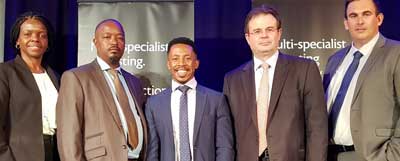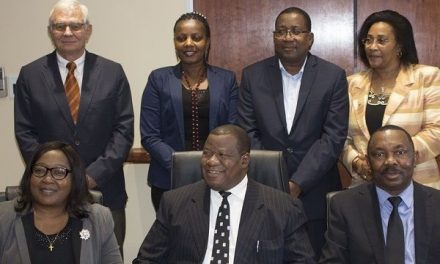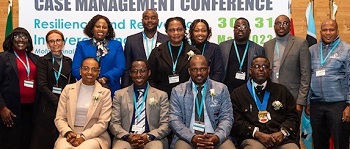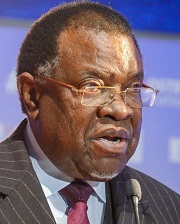
Governments to create environment in which business can drive growth

Stanlib Namibia held their annual economic roadshow in Swakopmund and Windhoek this week. This occasion provided invited guests with a perspective on the current economic situation globally as well as in Sub-Saharan Africa and Namibia.
Kevin Lings, Chief Economist of the Stanlib Group opened his address by giving a perspective on the current turbulent economic times which were affected by domestic and international happenings such as BREXIT and proposed trade tariffs in the USA.
He said that the world economy was doing fine and growth in the developed markets, albeit lower at around 2%, had been consistent over the past eight years. “One of the benefits of a consistent moderate growth rate is job creation. Employment in Germany, the UK, Japan and the US has been growing and around 28 million jobs have been steadily created over the past eight years. Germany is experiencing the lowest unemployment rate ever, while world trade volumes have also shown improved growth from 2009 onwards -this should also bode well for happenings in developing markets, such as Africa.”
When looking at the United States of America Kevin advises that President Donald Trump, while controversial, has effected numerous positive changes in the country, especially with his America First (Make America great again) philosophy. “He has lifted economic growth, restored confidence in both business as well as many individuals, who have, for example been given tax breaks and have been put first. The last eight years have been good in the US, led by a 20% economic growth since 2009 and the creation of 18 million jobs. These changes were already underway when Obama was still at the helm, and today – under Trump – the US household wealth is the highest it has ever been. Consumer confidence is up, the house market is at an all-time high and in a recent study it was revealed that US business happiness is the greatest it has been due to personal and corporate tax cuts, tax incentives to bring back business to the US, de-regulations and the like.”
“While GDP growth in the US bodes well for smaller markets, we are nevertheless keeping an eye on the President and happenings, such as the proposed trade tariffs, which could have a negative impact on several economies,” added Lings.
Turning to South Africa Kevin stated that the government no longer had the money to be at the centre of economic growth in South Africa. “South Africa is projecting a 2% growth at this stage and this is simply not good enough to plug all the debt holes which have sprung up since 2009. While we know that the markets have welcomed the appointment of Cyril Ramaphosa as President, the transition to a 4.2% average growth which we had from 2000 – 2009 will be a long and arduous journey. The average age of the SA population is 24 and 1,2 million children start school every year – so job creation is the biggest priority that SA faces. To be able to meet all demands and to keep unemployment from rising we need to create 600 000 jobs per year.”
Kevin added, that the debt accumulation over the past nine years has been unsustainable. “Social grants have increased from 2,9 million people in 2000 to 17,5 million in 2018. This number will only grow if jobs are not created and jobs will only be created if the SA economy grows by at least 4%. Other negative factors currently facing SA include the fact that the tax revenue is below budget and foreign borrowings have increased. South Africa has borrowed 1 trillion Rand in the last 8 years and while it was promised for infrastructure development, most of the money in actual fact went for salary payments of a bloated government. This debt excludes debt by the SOE’s which also runs into billions of Rands.”
Kevin said that Cyril Ramaphosa is unlikely to rock the boat too much this year, in anticipation of the 2019 elections as there are many potential voters that he must keep happy to win the Presidency. “We are, however, optimistic about his Presidency but need to emphasize that the onus rests on both the government and the business sector to grow this country. There is a simple answer – Government must create a climate for business to grow and thrive and be happy. If this happens, investment will follow, which leads to infrastructure development and employment creation. Employed people are happy people, not reliant on government grants and will contribute to the tax coffers.”
Kganya Kgare, Economist: Emerging markets, Stanlib Namibia concentrated on Africa and the sub-Saharan region in his presentation, pointing out that sub – Saharan Africa (SSA) growth had fallen behind the growth that was experienced in the developed world. Looking at the SSA economic cycle he noted that Namibia was currently in a recession. Nigeria, SA, Botswana, Angola and Swaziland experienced a recovery, while Tanzania, Uganda, Ivory Coast, Ghana, Ethiopia and Rwanda were expanding and Kenya and Zambia currently slowing down.
“Namibia is currently in a recession, although this could change very soon. Growth in the country has been severely hampered by the lack of growth in the construction sector. The government cut expenditure on the CAPEX budget, which has led to construction being halted and this has had a huge impact on the economy having been dragged into a recession.”
Kganya added that Namibia was also faced with a huge public-sector bill and declining SACU revenues driven by declining demand for goods from SA. “All of these factors have led to a budget deficit and it will not be easy to clear this debt. In the short term one would hope that Husab Mine will pick up production and that a cut in interest rates will stimulate the economy.”
Kganya concludes: “As Kevin rightly stated, Government needs to draw back and not remain too involved in the economy. They should ensure that there is a positive economic climate, conducive for business and investment and all other positive factors will follow.”
Caption: Left to Right: Taimi Shejavali: Managing Director STANLIB Namibia; Martinianus Tibinyane: Portfolio Manager for Money Market Funds STANLIB Namibia; Kganya Kgare: Economist STANLIB SA; Kevin Lings: Chief Economist STANLIB SA and Hendrik van der Merwe: Head of Business Development STANLIB Namibia













































